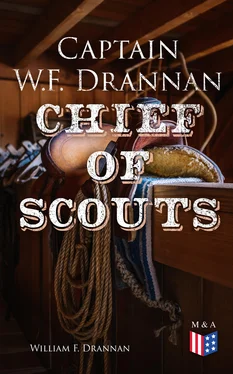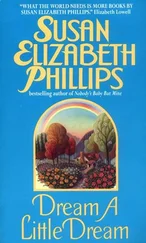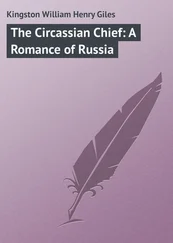William F. Drannan - Captain W.F. Drannan – Chief of Scouts
Здесь есть возможность читать онлайн «William F. Drannan - Captain W.F. Drannan – Chief of Scouts» — ознакомительный отрывок электронной книги совершенно бесплатно, а после прочтения отрывка купить полную версию. В некоторых случаях можно слушать аудио, скачать через торрент в формате fb2 и присутствует краткое содержание. Жанр: unrecognised, на английском языке. Описание произведения, (предисловие) а так же отзывы посетителей доступны на портале библиотеки ЛибКат.
- Название:Captain W.F. Drannan – Chief of Scouts
- Автор:
- Жанр:
- Год:неизвестен
- ISBN:нет данных
- Рейтинг книги:4 / 5. Голосов: 1
-
Избранное:Добавить в избранное
- Отзывы:
-
Ваша оценка:
- 80
- 1
- 2
- 3
- 4
- 5
Captain W.F. Drannan – Chief of Scouts: краткое содержание, описание и аннотация
Предлагаем к чтению аннотацию, описание, краткое содержание или предисловие (зависит от того, что написал сам автор книги «Captain W.F. Drannan – Chief of Scouts»). Если вы не нашли необходимую информацию о книге — напишите в комментариях, мы постараемся отыскать её.
Captain W.F. Drannan – Chief of Scouts — читать онлайн ознакомительный отрывок
Ниже представлен текст книги, разбитый по страницам. Система сохранения места последней прочитанной страницы, позволяет с удобством читать онлайн бесплатно книгу «Captain W.F. Drannan – Chief of Scouts», без необходимости каждый раз заново искать на чём Вы остановились. Поставьте закладку, и сможете в любой момент перейти на страницу, на которой закончили чтение.
Интервал:
Закладка:
William F. Drannan
Captain W.F. Drannan – Chief of Scouts
Autobiography
Madison & Adams Press, 2021
Contact: info@madisonadamspress.com
EAN 4064066384166
This is a publication of Madison & Adams Press. Our production consists of thoroughly prepared educational & informative editions: Advice & How-To Books, Encyclopedias, Law Anthologies, Declassified Documents, Legal & Criminal Files, Historical Books, Scientific & Medical Publications, Technical Handbooks and Manuals. All our publications are meticulously edited and formatted to the highest digital standard. The main goal of Madison & Adams Press is to make all informative books and records accessible to everyone in a high quality digital and print form.
Table of Contents
PREFACE PREFACE Table of Contents The kindly interest with which the public has received my first book, "Thirty-one Years on the Plains and in the Mountains," has tempted me into writing this second little volume, in which I have tried to portray that part of my earlier life which was spent in piloting emigrant and government trains across the Western Plains, when "Plains" meant wilderness, with nothing to encounter but wild animals, and wilder, hostile Indian tribes. When every step forward might have spelt disaster, and deadly danger was likely to lurk behind each bush or thicket that was passed. The tales put down here are tales of true occurrences,—not fiction. They are tales that were lived through by throbbing hearts of men and women, who were all bent upon the one, same purpose:—to plow onward, onward, through danger and death, till their goal, the "land of gold," was reached, and if the kind reader will receive them and judge them as such, the purpose of this little book will be amply and generously fulfilled.
CHAPTER I.
CHAPTER II.
CHAPTER III.
CHAPTER IV
CHAPTER V
CHAPTER VI.
CHAPTER VII.
CHAPTER VIII
CHAPTER IX.
CHAPTER X.
CHAPTER XI.
CHAPTER XII.
PREFACE
Table of Contents
The kindly interest with which the public has received my first book, "Thirty-one Years on the Plains and in the Mountains," has tempted me into writing this second little volume, in which I have tried to portray that part of my earlier life which was spent in piloting emigrant and government trains across the Western Plains, when "Plains" meant wilderness, with nothing to encounter but wild animals, and wilder, hostile Indian tribes. When every step forward might have spelt disaster, and deadly danger was likely to lurk behind each bush or thicket that was passed.
The tales put down here are tales of true occurrences,—not fiction. They are tales that were lived through by throbbing hearts of men and women, who were all bent upon the one, same purpose:—to plow onward, onward, through danger and death, till their goal, the "land of gold," was reached, and if the kind reader will receive them and judge them as such, the purpose of this little book will be amply and generously fulfilled.
CHAPTER I.
Table of Contents
At the age of fifteen I found myself in St. Louis, Mo., probably five hundred miles from my childhood home, with one dollar and a half in money in my pocket. I did not know one person in that whole city, and no one knew me. After I had wandered about the city a few days, trying to find something to do to get a living, I chanced to meet what proved to be the very best that could have happened to me. I met Kit Carson, the world's most famous frontiersman, the man to whom not half the credit has been given that was his due.
The time I met him, Kit Carson was preparing to go west on a trading expedition with the Indians. When I say "going west" I mean far beyond civilization. He proposed that I join him, and I, in my eagerness for adventures in the wild, consented readily.
When we left St. Louis, we traveled in a straight western direction, or as near west as possible. Fifty-eight years ago Missouri was a sparsely settled country, and we often traveled ten and sometimes fifteen miles without seeing a house or a single person.
We left Springfield at the south of us and passed out of the State of Missouri at Fort Scott, and by doing so we left civilization behind, for from Fort Scott to the Pacific coast was but very little known, and was inhabited entirely by hostile tribes of Indians.
A great portion of the country between Fort Scott and the Rocky
Mountains that we traveled over on that journey was a wild, barren
waste, and we never imagined it would be inhabited by anything but wild
Indians, Buffalo, and Coyotes.
We traveled up the Neosha river to its source, and I remember one incident in particular. We were getting ready to camp for the night when Carson saw a band of Indians coming directly towards us. They were mounted on horses and were riding very slowly and had their horses packed with Buffalo meat.
With the exception of Carson we were all scared, thinking the Indians were coming to take our scalps. As they came nearer our camp Carson said, "Boys, we are going to have a feast".
On the way out Carson had taught me to call him "Uncle Kit." So I said,
"Uncle Kit, are you going to kill an Indian and cook him for supper?"
He laughed and answered, "No, Willie, not quite as bad as that. Besides, I don't think we are hungry enough to eat an Indian, if we had one cooked by a French cook; but what will be better, to my taste at least, the Indians are bringing us some Buffalo meat for our supper," and sure enough they proved to be friendly.
They were a portion of the Caw tribe, which was friendly with the whites at that time. They had been on a hunt, and had been successful in getting all the game they wanted. When they rode up to our camp they surrounded Carson every one of them, trying to shake his hand first. Not being acquainted with the ways of the Indians, the rest of us did not understand what this meant, and we got our guns with the intention of protecting him from danger, but seeing what we were about to do, Carson sang out to us, "Hold on, boys. These are our friends," and as soon, as they were done shaking hands with him Carson said something to them in a language I did not understand, and they came and offered their hands to shake with us. The boys and myself with the rest stood and gazed at the performance in amazement, not knowing what to do or say. These were the first wild Indians we boys had ever seen. As soon as the hand shaking was over, Carson asked me to give him my knife which I carried in my belt. He had given the knife to me when we left St. Louis. I presume Carson had a hundred just such knives as this one was in his pack, but he could not take the time then to get one out. For my knife he traded a yearling Buffalo, and there was meat enough to feed his whole crew three or four days. That was the first Indian "Pow-wow" that I had ever seen or heard of either.
The Indians ate supper with us, and after that they danced "the Peace Dance" after smoking the Pipe of Peace with Uncle Kit. The smoking and dancing lasted perhaps an hour, and then the Indians mounted their horses and sped away to their own village.
I was with Carson off and on about twelve years, but I never saw him appear to enjoy himself better than he did that night. After the Indians had gone, Uncle Kit imitated each one of us as he said we looked when the Indians first appeared in sight. He had some in the act of running and others trying to hide behind the horse, and he said that if the ground had been loose we would have tried to dig a hole to crawl into. One of the party he described as sitting on his pack with his mouth wide open, and he said he could not decide whether the man wanted to swallow an Indian or a Buffalo.
Читать дальшеИнтервал:
Закладка:
Похожие книги на «Captain W.F. Drannan – Chief of Scouts»
Представляем Вашему вниманию похожие книги на «Captain W.F. Drannan – Chief of Scouts» списком для выбора. Мы отобрали схожую по названию и смыслу литературу в надежде предоставить читателям больше вариантов отыскать новые, интересные, ещё непрочитанные произведения.
Обсуждение, отзывы о книге «Captain W.F. Drannan – Chief of Scouts» и просто собственные мнения читателей. Оставьте ваши комментарии, напишите, что Вы думаете о произведении, его смысле или главных героях. Укажите что конкретно понравилось, а что нет, и почему Вы так считаете.












